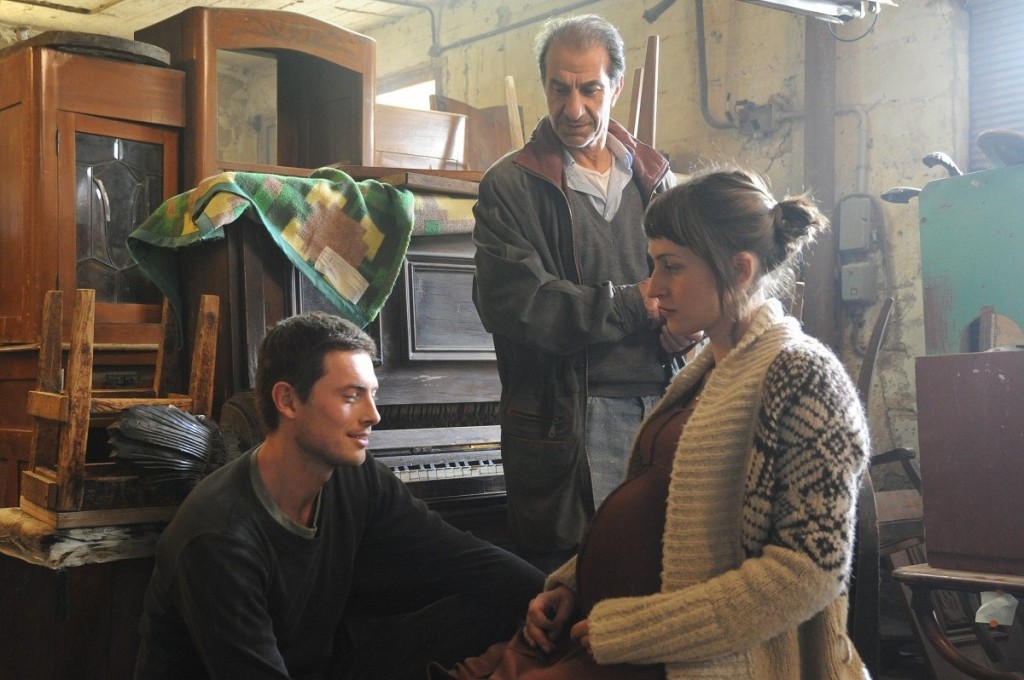
by Amy Stone
Feminists in Focus: Reporting back from the New York Jewish Film Festival Peeling Away the Layers of ‘Restoration’
(Check the calendar for the New York Jewish Film Festival, presented by The Jewish Museum and the Film Society of Lincoln Center, at www.thejewishmuseum.org/
 Finely crafted is the operative phrase for “Restoration.” The 2010 Israeli film (English subtitles) directed by Joseph Madmony tells the tale of Fidelman, an aging restorer of antique furniture stubbornly trying to hang onto his business. Starring Sasson Gabai (“The Band’s Visit”), “Restoration” unfolds with exquisite twists and turns that won it the Dramatic Screenwriting Award at this year’s Sundance Film Festival and several prizes at the Jerusalem Film Festival. (Madmony collaborated with Erez Kav-El on the script.)
Finely crafted is the operative phrase for “Restoration.” The 2010 Israeli film (English subtitles) directed by Joseph Madmony tells the tale of Fidelman, an aging restorer of antique furniture stubbornly trying to hang onto his business. Starring Sasson Gabai (“The Band’s Visit”), “Restoration” unfolds with exquisite twists and turns that won it the Dramatic Screenwriting Award at this year’s Sundance Film Festival and several prizes at the Jerusalem Film Festival. (Madmony collaborated with Erez Kav-El on the script.)
Set in a timeless corner of Tel Aviv, it takes cell phones and a digital camera with video option to make clear we’re in the present.
Enter Anton (Henry David), the mysterious drifter who becomes Fidelman’s assistant. Add Fidelman’s estranged son, Noah (Nevo Kimchi), and his very pregnant wife, Hava (Sarah Adler). And there’s the impact beyond the grave of his freshly deceased partner, Malamud, who managed the shop’s finances.
“Restoration” is a tale rich in ambiguities. As furniture gets stripped down, the characters add layers of complexity. Fidelman’s lawyer son wants to jettison his father’s workshop for a lucrative real estate deal. More betrayal, the drifter gets involved with the son’s wife.
The scenes are composed with painterly control – dark interiors with luminous faces in a sea of blues and greens. Close-ups with one of two characters partially cutoff. Out-of-focus edges framing a scene.
The soundtrack is a major player. Music from a string quartet of elderly sidewalk musicians is layered with the sounds of furniture restoration. Hardly harkening back to an idyllic age, the reverberating basement tones of the cello are cut against the violent planing of wood.
If there’s any tenderness, it’s certainly not from the drifter or the tale’s prostitutes, one with a giant Jewish star hanging above her cleavage.
(Part of Madmony’s directorial brilliance is that, aside from the four main characters, all the others are non-professional actors playing themselves. What working girl’s dream isn’t to be in movies?)
Fidelman may once have felt tenderness for the daintily curved furniture he restored. When he refers to a piece of furniture, it’s “she.”
He’s such a loner it’s hard to believe his wife ever existed beyond producing a son.
As for the generation still in utero, in what becomes an ongoing joke, whenever Hava is asked if she’s having a boy or a girl, she replies she doesn’t know. Her only reason for wanting a girl is that her husband wants a boy. Eventually the film does move toward a certain restoration of values.
The pleasures of “Restoration” are not just for film buffs. For those who still read novels, the film’s references to Bernard Malamud are front and center. For starters, Malamud is the name of Fidelman’s partner. And Fidelman is the name of one of the writer’s short story characters. Best of all, the film’s strange drifter with seductive charm could be the Tel Aviv reincarnation of “The Assistant,” the pivotal character in Malamud’s novel set in 1950s Brooklyn.
Appropriately, “Restoration” can be seen at the Brooklyn Israel Film Festival at the Kane Street Synagogue on Saturday, Jan. 28.